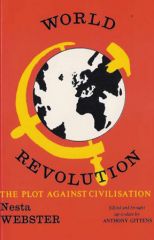
Author : Webster Nesta Helen (Mrs. Arthur Webster)
Title : World Revolution The plot against civilization
Year : 1921
Link download : Webster_Nesta_Helen_-_World_Revolution.zip
AUTHOR'S NOTE. In reply to numerous enquiries as to whether the statements I made in The French Revolution have since been disproved, I take this opportunity to say that, as far as I am aware, no one has attempted to bring forward any contrary evidence. The Socialist press was completely silent, whilst hostile reviewers in the general press contented themselves with saying the work was " biassed," but without quoting chapter and verse in support of this assertion. My book was not intended to be the last word on the French Revolution, but the first attempt, in English, to tell the truth, and had my view on any essential point been shown to be erroneous, I should have been perfectly ready to readjust it in further editions. No such honest challenge was made, however; my opponents preferring the method of creating prejudice against my work by attributing to me views I never expressed. Thus, at the moment of this book going to press, it has been brought to my notice that I am represented as having attacked British Freemasonry. This can only have been said in malice, as I have always clearly differentiated between British and Continental masonry, showing the former to be an honourable association not only hostile to subversive doctrines but a strong supporter of law, order, and religion. (See The French Revolution, pp. 20 and 492.) I am in fact indebted to certain distinguished British masons for valuable help and advice in my work, which I here gratefully acknowledge. FOREWORD. Amongst all the books, pamphlets, and newspaper articles that are now devoted to the World Revolution through which we are passing, it is strange to notice how little scientific investigation is being brought to bear on the origins of the movement. A frequent explanation advanced, and, I believe, the most fallacious, is that the present unrest must be attributed to " war weariness." Human nature, we are told, exasperated by the protracted horror of the recent international conflict, has become the victim of a crise de nerfs which finds its expression in world-wide discontent. In support of this theory we are reminded that former wars have likewise been followed by periods of social disturbance, and that by a process of analogy the symptoms may be expected to subside as the strain of war is relieved, in the same manner as they have subsided hitherto. It is true that political conflicts between nations have frequently in the past been followed by social upheavals — the Napoleonic Wars by industrial troubles in England, the Franco- Prussian War by revolutionary agitation not only in the land of the conquered, but of the conquerors — but to regard these social manifestations as the direct outcome of the preceding international conflict is to mistake contributing for fundamental causes. Revolution is not the product of war, but a malady that a nation suffering from the after-effects of a war is most likely to develop, just as a man enfeebled by fatigue is more liable to contract disease than one who is in a state of perfect vigour. Yet this predisposing cause is by no means essential to the outbreak of revolutionary fever. The great French Revolution was not immediately preceded by a war of any magnitude, and to the observant mind England in 1914 was as near to revolution as in 1919. The intervening World War, far from producing the explosion in this country, merely retarded it by rallying citizens of all classes around the standard of national defence. The truth is that for the last one hundred and fortyfive years the fire of revolution has smouldered steadily beneath the ancient structure of civilization, and already at moments has burst out into flame threatening to destroy to its very foundations that social edifice which eighteen centuries have been spent in constructing. The crisis of today is then no development of modern times, but a mere continuation of the immense movement that began in the middle of the eighteenth century. In a word, it is all one and the same revolution — the revolution that found its first expression in France of 1789. Both in its nature and its aims it differs entirely from former revolutions which had for their origin some localized or temporary cause. The revolution through which we are now passing is not local but universal, it is not political but social, and its causes must be sought not in popular discontent, but in a deep-laid conspiracy that uses the people to their own undoing. In order to follow its course we must realize the dual nature of the movement by studying concurrently the outward revolutionary forces of Socialism, Anarchism, etc., and the hidden power behind them as indicated in the chart accompanying this work. The present writer believes that hitherto no book has been written on precisely these lines ; many valuable works have been devoted to secret societies, others to the surface history of revolution, but none so far has attempted to trace the connection between the two in the form of a continuous narrative. The object of this book is therefore to describe not only the evolution of Socialist and Anarchist ideas and their effects in succeeding revolutionary outbreaks, but at the same time to follow the workings of that occult force, terrible, unchanging, relentless, and wholly destructive, which constitutes the greatest menace that has ever confronted the human race. Parts of Chapters I and III appeared in The Nineteenth Century and After, and certain later passages in The Morning Post. ...

Gaidoz Henri - Etudes de mythologie gauloise
Auteur : Gaidoz Henri Ouvrage : Etudes de mythologie gauloise Année : 1886 Lien de téléchargement :...














